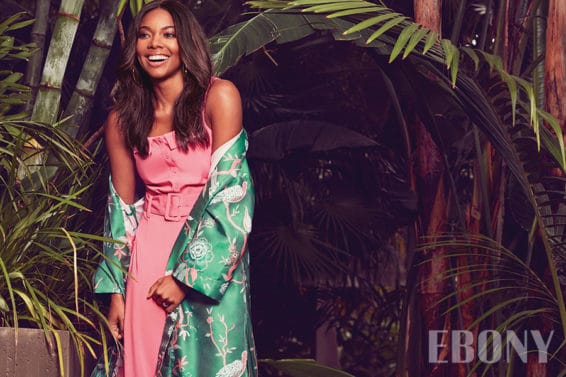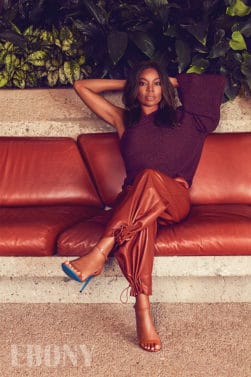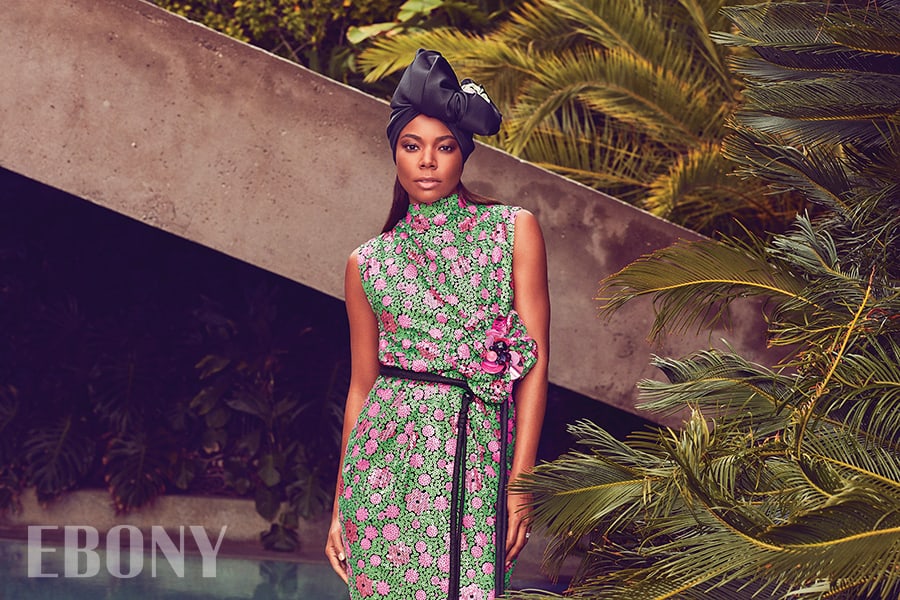[ad_1]
EBONY magazine’s April/May 2018 cover star, Gabrielle Union, began her acting career in the early ’90s and has blossomed into a not only a film and television star but also a model wife and career mom and business maven. In recent years, Union has starred in the BET series Being Mary Jane, worked on her eponymous fashion collection with New York & Company, and released a hair care brand, Flawless by Gabrielle Union.
The outspoken star, who previously said not to mirror her relationship, now talks to EBONY.com about rejecting the pressure placed on her as a woman to maintain all the order in her and her family’s life and opens up about the growing representation in media and how the lack of diversity in Hollywood affects Black actors’ hair and makeup.
You’re a wife, stepmom and businesswoman; how do you balance it all?
I talk a lot about the myth of “balance.” You can’t be everything to everybody because [one of those things] isn’t going to be amazing.
Once I realized my husband [Dwyane Wade] is never asked how he balances it all because they don’t assume that he has to have balance—bringing home a check and having career success is enough for him—I stopped subscribing to it. I was like, “Well s**t,” if we’re only holding certain people to those standards, I’m going to go ahead and opt out.
How do you determine what takes priority?
I’m going to do my best to be an amazing global citizen, and if one day I want to try to be the best businesswoman in the world, that doesn’t leave a ton of time to be the most philanthropic person. It also doesn’t leave time to volunteer or be the supermother who brings gluten-free, dairy-free, nut-free, perfect homemade brownies to [an event]. I may not be the best friend who can be there and drop everything for every crisis.
It’s OK to not be everything to everybody at all times. Anyone in my life knows I’m going to do my best, but I’m not going to go crazy. I’m not going to let people stress me out. I’m going to say no to things and create clear boundaries. Magically, the world [will] keep ticking.

(Credit: EBONY Magazine)
What do you think about the gender bias associated with being “perfect”?
My husband is living his best life. He’s carefree, but it’s also because no one is putting s**t on his plate about him having to balance anything. He’s open about having a village that helps with childcare. He’s honest about not having every business answer because he has a team in place.
People must pitch in every aspect of life. The bar is quite low for dudes, and I’d like it to be lowered for every other woman and me. Stop demanding that we be chefs, have The Kuma Sutra memorized, appear at every PTA meeting and be perfect wives.
[As a woman,] you have to be a freaking CEO of a Fortune 500 company [and] have a perfect relationship. We have to make time to donate at an animal shelter. We must be everything, and it’s like, When do you just sit on the toilet and scroll Twitter? I need all that time.
I do my best, and magically, the kids are OK with that. My husband’s OK with that, and my co-workers are fine. I do my best, and that’s not balance … I’m sorry I can’t make every practice or game. It’s OK to give yourself a freaking break.
I commend you on that because I’m a new mom and finding balance has been tough.
If you try to do everything, you will put yourself in an early grave. If you try to be perfect at everything, you’ll leave a very pretty young corpse. It is too much, and it is OK to say, “I don’t have it today.”
Men do it every day, and they keep going. We’ve become such slaves to judgment that we can’t live. We’re not enjoying s**t because we just keep adding more s**t. Then if you don’t do all these things, you are not a woman. You’re not a perfect woman, wife or a mother. It’s like, F**k this, I need to sit down, and that’s OK.
Speaking about motherhood, you recently shared a story about how you’re tackling colorism with your stepsons. Then Black women dominated the covers for September issues.
It’s delicious!
How do you feel about the diversity and the inclusion of women of color and Black women across the board?
It feels good. We were just talking about it the other night with my group of girlfriends, and we were talking about how much it meant to see Janet Jackson as Charlene on Diff’rent Strokes and how her character got introduced to the show. It was must-see TV because Willis had a Black girlfriend and it was Janet Jackson. Holy s**t!
Then my girl [asked], “Do you remember when Vivica A. Fox was on 90210 as the popcorn king’s daughter and Brandon had a crush on her?” I [responded], “Oh, my God! I remember that.”
The fact that we can remember characters from almost 40 years ago . . . still means [it is] something to see ourselves reflected in mainstream media. [To witness] our stories, our beauty, our narrative, just us and our existence be celebrated means so much.

(Credit: EBONY magazine)
I don’t know what the word is, [but] it’s beyond pride when I see Issa Rae or Jada [Pinkett Smith], Queen Latifah or Vivica at the WNBA games. I give you all your flowers, your chocolates and your praise. I bow down because of what you have meant and what you continue to mean; it’s a big f***ing deal.
I just want to make sure everybody knows that, and that we see you. We are proud of you, and it means a lot to see yourself reflected so the next generation doesn’t have to remember one character from the ’80s. I hugged Kim fields [when I saw her] like we were Nettie and Celie [from The Color Purple] because of what she means to a certain generation of us who saw ourselves reflected in one girl as a series regular on network television.
It’s nice that there’s a diversity of hair texture, skin colors, bodies and life experiences. Finally, people get that there’s enough space and a place for all of us to be loved and celebrated. There’s enough light to be shined on everybody. It just feels f**king good. Maybe that’s what’s bigger than pride: being f***ing good. Great.
Let’s talk about hair texture. In her September 2018 cover story for Porter magazine, Lupita Nyong’o talked about how natural hair has been deemed “uncivilized” in society. Your haircare brand, Flawless by Gabrielle Union, which is carried at Ulta, caters to different hair types. Can you talk about your experience with your hair texture and Hollywood?
There has been an increase in diversity in Hollywood. People are saying, “I’m not going to shape-shift for you or under the White gaze so that you are comfortable.”
My soul feels chipped away at, and going back many decades, I was literally burning my hair off to please you, to create some sort of illusion [and] idea of Black femininity for someone who doesn’t want me to win to begin with. Now that there are so many more women of color in Hollywood—specifically, so many kinds of Black women from the African diaspora—we are over making the compromise or being forced into hairstyles that we don’t feel are right for the character or right for us personally or our hair health.
Lupita said it very eloquently, but to add to that conversation, we can only use hairstylists and makeup artists who are in the union where our TV shows and our films are shot. [Although] the diversity has increased, the diversity in the union has not. [When] we get to set, we don’t have the luxury—and I’m being very facetious when I say that—of having someone who is not only comfortable but also has knowledge of all different kinds of hair textures. [Black women] are sitting in chairs as guinea pigs watching our hair literally being fried off our heads because the unions are not letting in qualified stylists who have been trying to get into the union for years.
What about makeup, and hair and makeup in general?
If they don’t let Black talent or talent of color bring in their own team that we are comfortable with, you can get to set for one of your biggest opportunities, mediawise and you’re like, “Oh s**t, I’m about to look nuts.”
You don’t even have colors that go deep enough for my shade in your makeup kit, and what are you going to do with that curling iron?
The other part of the conversation, especially for Hollywood, is that the union needs to let those doors fly open. They need to let in all the qualified hairstylists [and] makeup artists of color who know what the hell they’re doing, meeting the demand of all the diversity. There’s nothing worse than getting your big break, and you get to a show and you know that even though everybody else can just roll out of bed, hair wet and come to set, you don’t have that luxury.
You’re going to have to pay out of your own pocket to get your hair done before you come to work. You better sleep pretty and hope it looks good by the time you get to work. That way no one has to touch it. You better make sure you bring your own makeup to [ensure] they have your shade.
They don’t ask White talent to do that. They don’t ask for other talent to do it because it is standard. If you talked to anybody who’s been in the business for more than two weeks, there are a bunch of these stories, and that has to stop. No matter how big you get, these are still the fights you have on every damn project.
[ad_2]
Source link

